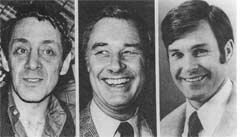After the film, Milk, was released this year, I began to think that those who died in Jonestown did die in vain. There was a mention of Kool Aid, which made me want to yell at the screen “It was Flavor-Aid!” Other than that false but iconic reference, there was no mention of the hundreds lost in Jonestown only days before Harvey Milk and Mayor George Moscone’s assassinations.
After all, Jim Jones and his followers had supported Harvey Milk and George Moscone. They had contributed to their campaigns with time and resources. Personally, I think Milk and Moscone became true politicians by distancing themselves from Jones and Peoples Temple after November 18, 1978, setting themselves apart from the people they knew who perished that day.
But how about before the deaths in Jonestown? Milk and Moscone failed to investigate Jones and Peoples Temple despite the constant rumors in the press about abusive practices and fraud. Instead, Moscone appointed Jim Jones to the San Francisco Housing Authority as a patronage position for getting Temple members to campaign for the mayoral candidate, attend his rallies, and vote for him. Neither is there a denial of the relationship between Milk and Jones. Milk had sent letters of support, attended a few church services, and – like Moscone – knew Jones from San Francisco politics. Jones’ progressive views on homosexuality and civil rights was quite radical in the seventies, particularly from an activist minister. To have Jim Jones’ support – for both men – was essential in San Francisco politics at that time in history.
So where was their sense of conscience at the horrifying loss? Why didn’t they run to Peoples Temple in San Francisco and console the members? Why didn’t they assure the relatives of the Jonestown dead that the city would assist them in claiming their kin? What – if anything – did the two men do between November 19, 1978 and November 26?
 I can only imagine the horror of life in San Francisco in November 1978. As if the city was not reeling enough from so much carnage in a faraway country, they had to deal with double assassinations of the first openly gay supervisor and the mayor, killed by a troubled colleague, Dan White, who himself later committed suicide.
I can only imagine the horror of life in San Francisco in November 1978. As if the city was not reeling enough from so much carnage in a faraway country, they had to deal with double assassinations of the first openly gay supervisor and the mayor, killed by a troubled colleague, Dan White, who himself later committed suicide.
Still, I think consider Milk and Moscone’s inaction during those ten days a betrayal of Peoples Temple. They had been their supporters. They had been their voters. They had been their constituents. Then they were none of these, but rather, former Bay Area residents who left for a foreign country. And then, on November 18, there were just bodies rotting under the cruel heat in the South American jungle.
I do not condemn director Gus Van Sant, actor Sean Penn, and the screenwriters for Milk for the film’s omission of Jonestown, but they should explain their reasoning. If they had included Jonestown and the Milk’s connection to the Temple, maybe they would have humanized the man more to me than some kind of gay superhero or martyr to the cause.
I also felt that, while society has learned its lesson from the Milk and Moscone assassinations, they still have yet to understand immeasurable loss in Jonestown, Guyana. A whole community was wiped out by self-destruction. I remember Annie Moore’s last haunting words: “We died because you would not let us live.” That sentence explains so much about the mentality of Jones and his followers. Much of it reflected their own exhaustion, but much was in response to pressure from the Concerned Relatives and the media back home.
I believe that God could have prevented the catastrophe but that – for some reason – he allowed the deaths to happen. There is evidence that Jim Jones was in failing health; God could have taken Jones before the congressman’s arrival. He could have led somebody to rebel against the armed guards and overturn the vat of poison. No, none of those things happened because they were not supposed too.
The events of Jonestown were scripted by a higher power, but I feel that we have not learned anything about the people and why they died in the first place. I just know that they are in a better place where there are at peace and surrounded by love and light. I believe deep in my heart that they have already forgiven Milk and Moscone for abandoning and ignoring their deaths. Some of the people of Jonestown embraced death as an escape from a hellish existence on earth. It does not matter to them anymore but we are lost without them and we should all have survivor’s guilt because our world is a lot less without them.
Still, I feel that if Harvey Milk should get a day to commemorate his achievement as a gay rights activist, then perhaps the people of Jonestown to be remembered as more than just a bunch of crazies who died at the hands of a madman on November 18, 1978? Maybe we should remember all of them instead of just Harvey Milk.
(Sylvia Marciniak is a regular contributor to the jonestown report. Her complete collection of writings for the site may be found here. She can be reached at Sylviastel@aol.com.)